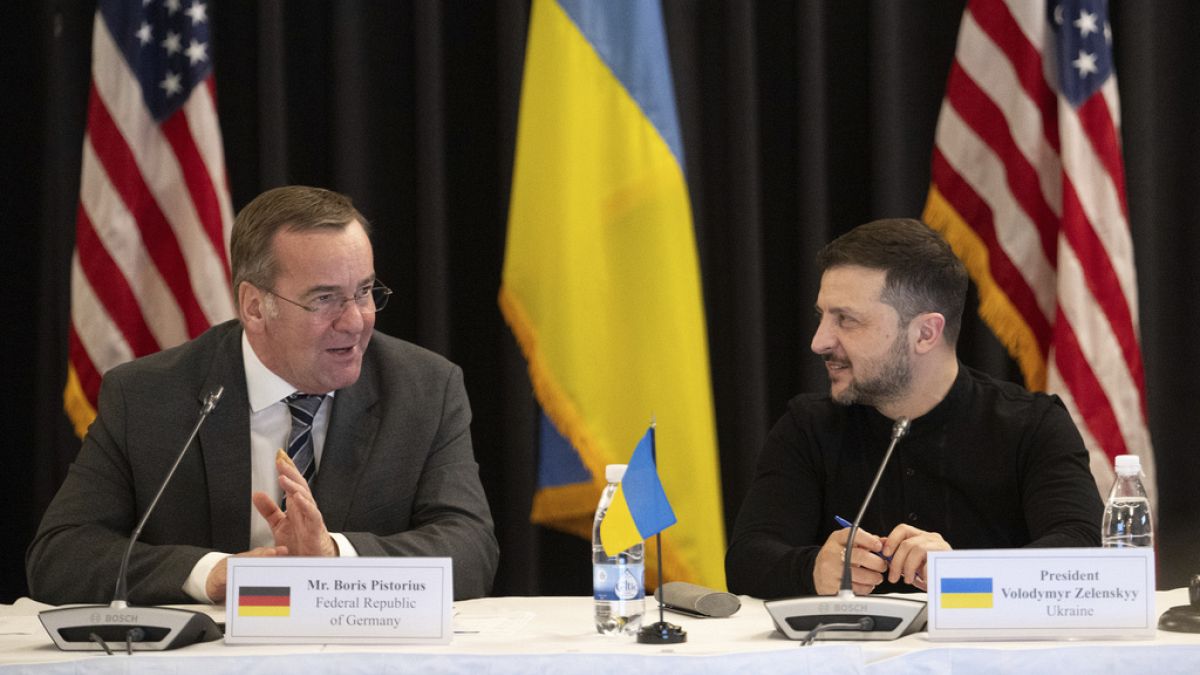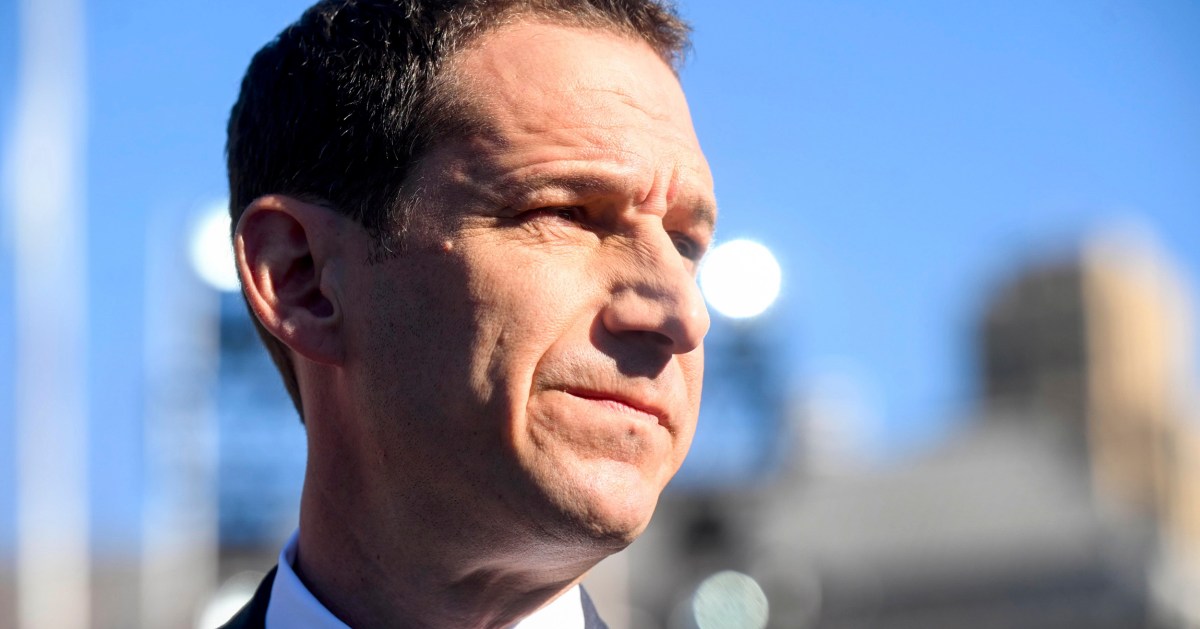World
A Black woman was criminally charged after a miscarriage. It shows the perils of pregnancy post-Roe

COLUMBUS, Ohio (AP) — Ohio was in the throes of a bitter debate over abortion rights this fall when Brittany Watts, 21 weeks and 5 days pregnant, began passing thick blood clots.
The 33-year-old Watts, who had not shared the news of her pregnancy even with her family, made her first prenatal visit to a doctor’s office behind Mercy Health-St. Joseph’s Hospital in Warren, a working-class city about 60 miles (100 kilometers) southeast of Cleveland.
The doctor said that, while a fetal heartbeat was still present, Watts’ water had broken prematurely and the fetus she was carrying would not survive. He advised heading to the hospital to have her labor induced, so she could have what amounted to an abortion to deliver the nonviable fetus. Otherwise, she would face “significant risk” of death, according to records of her case.
That was a Tuesday in September. What followed was a harrowing three days entailing: multiple trips to the hospital; Watts miscarrying into, and then flushing and plunging, a toilet at her home; a police investigation of those actions; and Watts, who is Black, being charged with abuse of a corpse. That’s a fifth-degree felony punishable by up to a year in prison and a $2,500 fine.
Her case was sent last week to a grand jury. It has touched off a national firestorm over the treatment of pregnant women, and especially Black women, in the aftermath of the U.S. Supreme Court’s Dobbs v. Jackson Women’s Health Organization decision that overturned Roe v. Wade. Civil rights attorney Benjamin Crump elevated Watts’ plight in a post to X, formerly Twitter, and supporters have donated more than $100,000 through GoFundMe for her legal defense, medical bills and trauma counseling.
Whether abortion-seekers should face criminal charges is a matter of debate within the anti-abortion community, but, post-Dobbs, pregnant women like Watts, who was not even trying to get an abortion, have increasingly found themselves charged with “crimes against their own pregnancies,” said Grace Howard, assistant justice studies professor at San José State University.
“Roe was a clear legal roadblock to charging felonies for unintentionally harming pregnancies, when women were legally allowed to end their pregnancies through abortion,” she said. “Now that Roe is gone, that roadblock is entirely gone.”
Michele Goodwin, a law professor at the University of California, Irvine, and author of “Policing The Womb,” said those efforts have long overwhelmingly targeted Black and brown women.
FILE – The U.S. Supreme Court is seen, with a carving of Justice in the foreground, April 19, 2023, in Washington. A Black Ohio woman who miscarried in her bathroom has been charged with abuse of a corpse and awaits grand jury action. Her case has sparked a national firestorm over the plight of pregnant women, especially women of color, following the U.S. Supreme Court’s decision to overturn Roe v. Wade. (AP Photo/Jacquelyn Martin, File)
Even before Roe was overturned, studies show that Black women who visited hospitals for prenatal care were 10 times more likely than white women to have child protective services and law enforcement called on them, even when their cases were similar, she said.
“Post-Dobbs, what we see is kind of a wild, wild West,” said Goodwin. “You see this kind of muscle-flexing by district attorneys and prosecutors wanting to show that they are going to be vigilant, they’re going to take down women who violate the ethos coming out of the state’s legislature.” She called Black women “canaries in the coal mine” for the “hyper-vigilant type of policing” women of all races might expect from the nation’s network of health-care providers, law enforcers and courts now that abortion isn’t federally protected.
In Texas, for example, Republican Attorney General Ken Paxton mounted an aggressive and successful defense against a white Texas mother, Kate Cox, who sued for permission to skirt the state’s restrictive abortion law because her fetus had a fatal condition.
At the time of Watts’ miscarriage, abortion was legal in Ohio through 21 weeks, six days of pregnancy. Her lawyer, Traci Timko, said Watts left the hospital on the Wednesday when, coincidentally, her pregnancy arrived at that date — after sitting for eight hours awaiting care.
It turned out the delay was because hospital officials were deliberating over the legalities, Timko said. “It was the fear of, is this going to constitute an abortion and are we able to do that,” she said.
At the time, vigorous campaigning was taking place across Ohio over Issue 1, a proposed amendment to enshrine a right to abortion in Ohio’s constitution. Some of the ads were harshly attacking abortions later in pregnancy, with opponents arguing the issue would allow the return of so-called “partial-birth abortions” and pregnancy terminations “until birth.”
The hospital did not return calls seeking confirmation and comment, but B. Jessie Hill, a law professor at Case Western Reserve University School of Law in Cleveland, said Mercy Health-St. Joseph’s was in a bind.
“These are the razor’s edge decisions that health care providers are being forced to make,” she said. “And all the incentives are pushing hospitals to be conservative, because on the other side of this is criminal liability. That’s the impact of Dobbs.”
Watts had been admitted to the Catholic hospital twice that week with vaginal bleeding, but she left without being treated. A nurse told the 911 dispatcher that Watts returned no longer pregnant on that Friday. She said Watts told her, “the baby’s in her backyard in a bucket,” and that she didn’t want to have a child.
Timko said Watts insists she doesn’t recall saying the pregnancy was unwanted; it was unintended, but she had always wanted to give her mother a grandchild. Her lawyer believes Watts may have meant that she didn’t want to fish what she knew was a dead fetus from the bucket of blood, tissue and feces that she’d scooped from her overflowing toilet.
“This 33-year-old girl with no criminal record is demonized for something that goes on every day,” she told Warren Municipal Court Judge Terry Ivanchak during Watts’ recent preliminary hearing.
Warren Assistant Prosecutor Lewis Guarnieri told Ivanchak that Watts left home for a hair appointment after miscarrying, leaving the toilet clogged. Police would later find the fetus wedged in the pipes.
“The issue isn’t how the child died, when the child died,” Guarnieri told the judge, according to TV station WKBN. “It’s the fact the baby was put into a toilet, was large enough to clog up the toilet, left in that toilet, and she went on (with) her day.”
In court, Timko bristled at Guarnieri’s suggestion.
“You cannot be broadcasting any clearer that you just don’t get it,” she said in an interview, suggesting Watts was scared, anxious and traumatized by the experience. “She’s trying to protect Mama. She doesn’t want to get her hair done. She wants to stop bleeding like crazy and start grieving her fetus, what she’s just been through.”
As chief counsel to the county’s child assault protection unit, Assistant Trumbull County Prosecutor Diane Barber is the lead prosecutor on Watts’ case.
Barber said she couldn’t speak specifically about the case other than to note that the county was compelled to move forward with it once it was bound over from municipal court. She said she doesn’t expect a grand jury finding this month.
“About 20% of the cases get no-billed, (as in) they do not get indicted and the case does not proceed,” she said.
The size and stage of development of Watts’ fetus — precisely the point when abortion crossed from legal to illegal without exceptions — became an issue during her preliminary hearing.
A county forensic investigator reported feeling “what appeared to be a small foot with toes” inside Watts’ toilet. Police seized the toilet and broke it apart to retrieve the intact fetus as evidence.
Testimony and an autopsy confirmed that the fetus died in utero before passing through the birth canal. In regard to abuse, the examination identified “no recent injuries.”
Ivanchak acknowledged the case’s complexities.
“There are better scholars than I am to determine the exact legal status of this fetus, corpse, body, birthing tissue, whatever it is,” he said from the bench. “Matter of fact, I’m assuming that’s what … Issue 1’s all about: at what point something becomes viable.”
Timko, a former prosecutor, said Ohio’s abuse-of-corpse statute is vague. It prohibits treating “a human corpse” in a way that would “outrage” reasonable family or community sensibilities.
“From a legal perspective, there’s no definition of ‘corpse,’” she said. “Can you be a corpse if you never took a breath?”
Howard said clarity on what about Watts’ behavior constituted a crime is essential.
“For rights of people with the capacity for pregnancy, this is huge,” she said. “Her miscarriage was entirely ordinary. So I just want to know what (the prosecutor) thinks she should have done. If we are going to require people to collect and bring used menstrual products to hospitals so that they can make sure it is indeed a miscarriage, it’s as ridiculous and invasive as it is cruel.”

World
As wildfires rage in Los Angeles, Trump doesn't offer much sympathy. He's casting blame.
WASHINGTON (AP) — As cataclysmic wildfires rage across Los Angeles, President-elect Donald Trump hasn’t been offering much sympathy. Instead, he’s claiming he could do a better job managing the crisis, spewing falsehoods and casting blame on the state’s Democratic governor.
Trump has lashed out at his longtime political foe Gov. Gavin Newsom’s forest management policies and falsely claimed the state’s fish conservation efforts are responsible for fire hydrants running dry in urban areas. Referring to the governor by a derisive nickname, Trump said he should resign.
Meanwhile, more than 180,000 people have been under evacuation orders and the fires have consumed more than 45 square miles (116 square kilometers). One that destroyed the neighborhood of Pacific Palisades became the most destructive blaze in Los Angeles history.
Trump v. Newsom: Round 2 was to be expected — the liberal Democrat has long been one of Trump’s biggest foils. But the Western fires are also a sign of something far more grave than a political spat or a fight over fish. Wildfire season is growing ever longer thanks to increasing drought and heat brought on by climate change.
Trump refuses to recognize the environmental dangers, instead blaming increasing natural disasters on his political opponents or on acts of God. He has promised to drill for more oil and cut back on renewable energy.
On Thursday, Trump said on social media that Newsom should “open up the water main” — an overly simplistic solution to a complex problem. “NO MORE EXCUSES FROM THIS INCOMPETENT GOVERNOR,” Trump said, adding, “IT’S ALREADY FAR TOO LATE!”
Standing on the street in a scorched subdivision as a home behind him was engulfed in flames, Newsom responded to the criticism when asked about it by CNN.
“People are literally fleeing. People have lost their lives. Kids lost their schools. Families completely torn asunder. Churches burned down, and this guy wants to politicize it,” Newsom said. “I have a lot of thoughts and I know what I want to say, but I won’t.”
In a post on his Truth Social media network, Trump tried to connect dry hydrants to criticism of the state’s approach to balancing the distribution of water to farms and cities with the need to protect endangered species including the Delta smelt. Trump has sided with farmers over environmentalists in a long-running dispute over California’s scarce water resources. But that debate has nothing to do with the hydrant issue in Los Angeles, driven by an intense demand on a municipal system not designed to battle such blazes.
About 40% of Los Angeles city water comes from state-controlled projects connected to northern California and the state has limited the water it delivers this year. But the southern California reservoirs these canals help feed are at above-average levels for this time of year.
Roughly 20% of hydrants across the city went dry as crews battled blazes, Los Angeles Mayor Karen Bass said. Firefighters in Southern California are accustomed to dealing with the strong Santa Ana winds that blow in the fall and winter, but the hurricane-force gusts earlier in the week took them by surprise. The winds grounded firefighting aircraft that should have been making critical water drops, straining the hydrant system.
“This is unlike anything I’ve seen in my 25 years on the fire department,” Los Angeles Fire Capt. Adam VanGerpen told CBS This Morning.
Janisse Quiñones, head of the Los Angeles Department of Water and Power, said the ferocity of the fire made the demand for water four times greater than “we’ve ever seen in the system.”
Hydrants are designed for fighting fires at one or two houses at a time, not hundreds, Quiñones said, and refilling the tanks also requires asking fire departments to pause firefighting efforts.
President Joe Biden, who was in California for an environmental event that ended up being canceled as the fires raged, appeared with Newsom at a Santa Monica firehouse on Wednesday and quickly issued a major disaster declaration for California, releasing some immediate federal funds.
But any additional federal response will be overseen by Trump, who has a history of withholding or delaying federal aid to punish his political enemies.
In September, during a press conference at his Los Angeles golf course, Trump threatened: “We won’t give him money to put out all his fires. And if we don’t give him the money to put out his fires, he’s got problems.”
Trump’s support in California has increased in recent years, which could further embolden him in his tussles with Democratic leaders there. In 2024, he improved on his vote share in Los Angeles and surrounding areas hit by the fires by 4.68 percentage points. And while he still lost the state overall, he grew his overall margin by 4 points compared to the 2020 election.
As for the impact of the fires on Californians, Trump said areas in Beverly Hills and around it were “being decimated” and that he had “many friends living in those houses.” He framed the losses as a potential hit to the state’s finances.
“The biggest homes, some of the most valuable homes in the world are just destroyed. I don’t even know. You talk about a tax base, if those people leave you’re going to lose half your tax base of California,” Trump said.
___
Associated Press Writer Maya Sweedler contributed to this report.
World
Thousands of Venezuelan opposition supporters take to the streets ahead of Maduro's third inauguration

- Venezuelan opposition parties and their supporters protested around the country on Thursday in a last-minute effort to put pressure on President Nicolás Maduro, one day before he is due to be sworn in for his third six-year term.
- Maria Corina Machado, Venezuela’s most popular opposition leader, made an appearance for the first time since August when she went into hiding at an unknown location.
- Venezuelan President Nicolás Maduro, 62, has been in power since 2013.
Venezuelan opposition parties and their supporters – including leader Maria Corina Machado, who had been in hiding – protested around the country on Thursday in an eleventh-hour effort to put pressure on President Nicolás Maduro, one day before he is due to be sworn in for his third six-year term.
The opposition and the ruling party are locked in an ongoing dispute over last year’s presidential election, which they both claim to have won.
The country’s electoral authority and top court say Maduro, whose time in office has been marked by a deep economic and social crisis, won the July vote, though they have never published detailed tallies.
VENEZUELAN OPPOSITION LEADER MARÍA MACHADO HAS URGENT MESSAGE FOR PRESIDENT-ELECT DONALD TRUMP
The government, which has accused the opposition of fomenting fascist plots against it, said it will arrest opposition leader Edmundo Gonzalez should he return to the country and has detained prominent opposition members and activists in the lead-up to the inauguration.
The opposition says Gonzalez, 75, won in a landslide. It has published its own vote tallies as evidence, winning support from governments around the world, including the United States, which consider Gonzalez the president-elect.
Machado, who is the country’s most popular opposition leader but who was barred from running in 2024, joined a protest in Chacao in eastern Caracas at around 2:20 p.m. local time (18:20 GMT), dressed in a white shirt and blue jeans and waving a Venezuelan flag from the top of a truck.
A supporter of Venezuela’s opposition reacts while gathering with fellow supporters ahead of President Nicolas Maduro’s inauguration for a third term, in Caracas, Venezuela, on Jan. 9, 2025. (Reuters/Leonardo Fernandez Viloria)
“They lost the streets, which are ours, they are barricaded in Miraflores (presidential palace),” Machado told the crowd. “From today we are in a new phase.”
Her appearance marked her first public outing since August when she went into hiding at an unknown location.
Machado, 57, urged protesters to peacefully flood the streets and repeatedly asked members of the police and military – who guarded polling stations during the election – to back Gonzalez’s victory.
“I’m not afraid, I lost my fear a long time ago,” said 70-year-old Neglis Payares, a retired central bank worker, as she gathered with other opposition supporters in western Caracas in the morning.
“We don’t know how many of them have their heart on our side,” she added, gesturing at security forces who had gathered near the protest.
2 AMERICANS ARRESTED IN VENEZUELA ON EVE OF MADURO INAUGURATION OVER ‘TERRORISM’ CLAIMS
Reuters witnesses estimated some 7,000 people had gathered in Caracas by around 2:20 p.m. local time. In the days after the election, thousands also took to the streets.
Maduro, 62, has been in power since 2013. He has the vociferous support of leaders in the armed forces and the intelligence services, which are run by close allies of powerful Interior Minister Diosdado Cabello.
“I am convinced nothing will happen,” Cabello said on state television on Monday. “But that doesn’t mean we will lower our guard.”
The military’s financial interests make loyalty shifts unlikely, said BancTrust, a London investment bank, in a note. “A limited military rebellion would entail significant risks for those involved, thus diminishing incentives to participate,” it wrote.
‘WE HAVE NO WORK’
Security forces set up checkpoints around the country.
In the western oil city of Maracaibo, an opposition protest of dozens of people was quickly dispersed by motorcycle-mounted security forces by late morning. In central Valencia, protesters gathered at another location after initially being met with tear gas.
Opposition supporters also gathered in San Cristobal, near the border with Colombia, in the western city of Barquisimeto and in eastern Puerto Ordaz.
“I’m here because we need to get rid of this government. We have no money, we have no work,” 62-year-old housewife Roisa Gomez said at a protest in the central city of Maracay. “I’m fighting for my vote, which I cast for Edmundo Gonzalez. They cannot steal the election.”
Soon afterward, security forces used tear gas to disperse the Maracay protesters.
Many of the demonstrators were of retirement age and said they wanted change so their migrant children and grandchildren would return to the country. More than 7 million Venezuelans live abroad.
The ruling party was holding rival marches nationwide, images of which were broadcast on state television.
“We’ve come out to show that there is a democracy. On this side are the patriots who will be sworn in with Nicolas (Maduro), on the other side are fascists who want (foreign) intervention, war, to sell their country,” said 50-year-old Caracas motorcycle taxi driver Manual Rincon.
Gonzalez, who has been on a tour of the Americas this week and met with U.S. President Joe Biden and President-elect Donald Trump’s national security advisor, has repeatedly pledged to return to Venezuela but given no details about how.
An arrest warrant was issued for Gonzalez for alleged conspiracy, prompting his September flight to Spain.
Machado is being investigated by the attorney general in at least two cases, but no warrant for her has been made public.
The government has detained several high-profile politicians and activists, including a former presidential candidate. This week, the attorney general’s office said it had freed more than 1,500 of the 2,000 people, including teenagers, detained during post-election protests.
Venezuelans living abroad also held protests, including in Madrid, where Gonzalez’s daughter Carolina Gonzalez spoke to hundreds of demonstrators.
“My dad sends a hug to all of you, glory to the brave people of Venezuela,” she said, her voice breaking.
World
Ramstein: Germany pledges tanks, missiles, and air defence for Ukraine

The German Defence Minister has pledged additional military aid to Ukraine at today’s meeting of the Ukraine Defence Contact Group in Ramstein.
At today’s Ukraine Defence Contact Group meeting in Ramstein, German Defence Minister Boris Pistorius has confirmed that Germany will continue its support for Ukraine even after the federal elections in February.
“Ukraine can count on Germany, regardless of the outcome of the election on February 23”, Pistorius said.
Speaking at a press conference after the meeting, Pistorius highlighted Germany’s contribution to protecting the largest logistics hub supporting Ukraine. “In the coming weeks, we will deploy two Patriot missile units and a total of 200 soldiers to Poland”, he announced. The Bundeswehr soldiers are expected to remain in Poland for six months as part of a NATO mission.
While Pistorius did not unveil a large-scale aid package for Ukraine, he pledged to provide the Ukrainian armed forces with three additional IRIS-T SLM and SLS air defence systems, along with 13 more Gepard tanks.
He also intends to supply additional missiles for the IRIS-T systems in the near future. These missiles are part of ongoing production and were originally allocated for the German Bundeswehr.
Contact Group to continue under Trump Presidency
Another key topic at the meeting was the impending Trump presidency in the United States. Pistorius emphasised the importance of continuing the Ukraine Contact Group meetings in Ramstein under Trump’s leadership.
But whether these meetings will actually persist, remains uncertain. However, should the new U.S. administration choose to discontinue the format, “it will need to continue in another form”, Pistorius asserted.
Zelenskyy places hope in Trump Presidency
Ukrainian President Volodymyr Zelenskyy has expressed his expectations for the incoming U.S. President, who is set to take office on January 20.
In light of the leadership transition, Zelenskyy also called for strengthened cooperation. “With Trump’s inauguration on January 20, we enter a period where we must work more closely together and achieve better results as a team”, he said during today’s Ukraine Contact Group meeting.
Speaking on a podcast with Russian-American host Lex Fridman earlier this week, Zelenskyy described Trump as a pivotal figure in the effort to stop Putin.
Tymofiy Mylovanov, former Ukrainian Minister of Economic Development and president of the Kyiv School of Economics, told Euronews he believed there will be a serious effort by the Trump administration to get a peace deal without selling out Ukraine. “The aid will continue as a part of strengthening leverage over Putin and enforcement of the deal”, he predicted.
According to Mylovanov, the EU and Germany will at the same time have to step up after Trump assumes office: “Trump has made it clear that Ukraine is the EU’s problem and Germany is the key power in the EU no matter how the local politics looks at the moment.”
-

 Business1 week ago
Business1 week agoThese are the top 7 issues facing the struggling restaurant industry in 2025
-

 Culture1 week ago
Culture1 week agoThe 25 worst losses in college football history, including Baylor’s 2024 entry at Colorado
-

 Sports1 week ago
Sports1 week agoThe top out-of-contract players available as free transfers: Kimmich, De Bruyne, Van Dijk…
-

 Politics1 week ago
Politics1 week agoNew Orleans attacker had 'remote detonator' for explosives in French Quarter, Biden says
-

 Politics7 days ago
Politics7 days agoCarter's judicial picks reshaped the federal bench across the country
-

 Politics5 days ago
Politics5 days agoWho Are the Recipients of the Presidential Medal of Freedom?
-

 Health4 days ago
Health4 days agoOzempic ‘microdosing’ is the new weight-loss trend: Should you try it?
-

 World1 week ago
World1 week agoIvory Coast says French troops to leave country after decades















